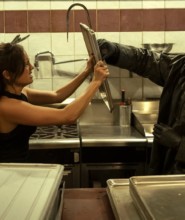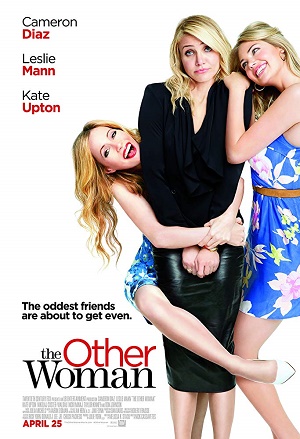
Mann, Diaz Shine in Otherwise Unflattering Woman
The Other Woman is not the movie you think it is going to be. What looks on the surface to be nothing more than a facile, superficial gross-out comedy about three women (two of whom are the unknown mistresses of the third’s supercilious cad of a husband) dealing with an insane romantic tug-of-war instead wants to be in its heart so much more than that. Screenwriter Melissa Stack attempts to manufacture a scenario where these women are far more than their stereotypical parts, trying to craft a tale of female empowerment, bonding and sisterhood that rises above the trite obnoxiousness of its central narrative hook.
All of which would be just fine if not for the last third. That’s when the film suddenly, irrevocably and disappointingly transforms into exactly the drivel many probably expected it to be from the start. This erases much of the goodwill generated by the initial portions of the story with upsetting rapidity. It takes disastrous turns, making its heroines so much less than they should be, reveling in nasty bits of bathroom humor and offensive misogynistic undertones (not to mention ghastly gender identity stereotypes) that are difficult to take seriously let alone comfortably endure.
Until then, however, The Other Woman is surprisingly winning. When hotshot New York lawyer Carly Whitten (Cameron Diaz) discovers the man she’s been having a whirlwind romance with, startup investment wizard Mark King (Nikolaj Coster-Waldau), is secretly married, she immediately tries to cut all ties. Problem is, the guy’s needy, relatively insecure suburban housewife Kate (Leslie Mann) requires a shoulder to cry on and she’s for some strange reason chosen the very woman who unintentionally wronged her to lay it down upon.
The pair strikes up a friendship even though they should hate one another. But the more Carly gets to know about Kate and vice-versa, the more they realize they’re largely cut from the same cloth. Each finds ways to empower the other, giving both women a reason to move on with their lives in the hope of bettering it in the long run. They talk to one another like adults, and although bouts of adolescent-like lunacy occur, for the most part they do their best to fall apart and put themselves back together with poise, intelligence and tenacity.
It is during these sections that the movie works best. Mann is great, dominating the story with her emotionally complex, free-flowing performance that surprises and never goes where I expected it to. She takes a character that on the surface could have been indefensibly insulting and transforms her into a figure of empowering grace, dignity and resilience.
As for Diaz, it’s actually kind of nice to see her play the straight woman. Instead of being the one doing all the pratfalls and the hijinks she gets to be the one who responds to all the craziness with restraint, slowly becoming the motherly center around which everything revolves. She doesn’t back away from Carly’s more odious and off-putting traits. Instead she embraces them, knowing that by doing so she’ll make her character’s transformational journey more relatable in the process.
It all ends up being for naught when the film finally decides to get around to its more tiresome aspects, most notably the arrival of a second mistress, good-hearted airhead Amber (Kate Upton), and the plot to get revenge on the man who’s done all three of them wrong kicks into gear. It turns into an adult version of John Tucker Must Die only played with little panache and even less charisma, going through the motions with a pandering exactitude that’s colossally disappointing.
For whatever reason Stack isn’t content with keeping Mark a smarmy, selfishly misogynistic rake and instead feels the need to transform him into an outright inhuman monster. But by doing this she ends up inadvertently stripping her heroines of the nuances that made them relatable, canceling out the emotional connection between them and the audience almost immediately. It’s frustrating to say the least, and by the time things predictably played themselves out I’m not sure I could have cared any less had I actively tried.
Director Nick Cassavetes stages a few nice sequences, a scene where Carly attempts to shove Kate into a cab is hysterical, and he’s certainly made a better motion picture than his insipidly unwatchable travesty of melodramatic excess that is The Notebook. But his handling of much of this borders on haphazard, lackadaisical shifts in tone and pacing keeping the highpoints from clicking as they maybe could have while also at the same time accelerating the film’s downfall by accentuating the more odious aspects of the story in ways that are inexplicably noxious.
Mann and Diaz are terrific, and Upton doesn’t do herself any harm even if the character she’s playing is as one-dimensionally cliché as they come. Yet The Other Woman still fails if only because it takes Carly and Kate and unceremoniously throws them under the bus. While other facets perplex, and while penultimate scenes with Coster-Waldau are unintentionally embarrassing, it’s the fact the film suddenly and without provocation treats both women with such little respect that is most upsetting. It belittles and humiliates them in ways bordering on the unforgivable, making a movie I was willing to proclaim a nifty little April surprise into nothing more than an unflattering letdown I’d honestly rather forget.
– Review reprinted courtesy of the SGN in Seattle
Film Rating: 2 (out of 4)








